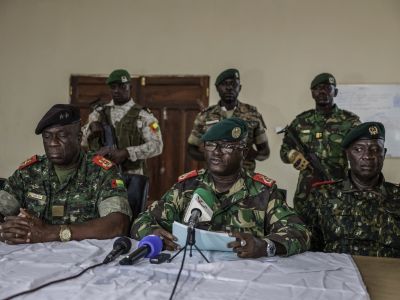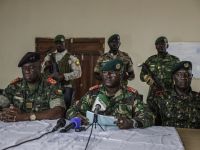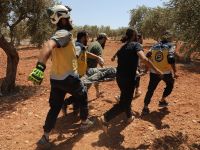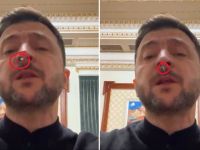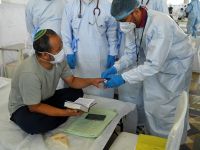A bomb exploded on Sunday in the Ein el-Hilweh Palestinian refugee camp in Southern Lebanon - the third such blast in as many days. No one was injured in the explosion. The bomb was the latest in a series of mysterious bombings targeting PLO officials
Ein el-Hilweh is the largest Palestine refugee camp in Lebanon. The camp is virtually an autonomous enclave, ruled by officials of the Palestine Liberation Organization - PLO. Over the past few weeks, a series of bombings have taken place at the camp, apparently targeting these PLO officials.
The target of Sunday’s blast is still unknown, but one day previously, on Saturday, a grenade was thrown at the home of Ali al-Shihabi, a member of Palestinian leader Yasser Arafat's Fatah movement.
One day earlier, on Friday, a stick of dynamite exploded near the home of another Fatah official, Khaled el-Shayeb, who is Fatah's top official for the Bekaa Valley region in eastern Lebanon.
Both of the weekend bombings resulted in no casualties, but several previous bombings have been more damaging. On June 14, a similar bombing attack injured the eight-year-old daughter of Abu Ali Tanios, who heads the Palestine Liberation Army, a force affiliated with the Palestine Liberation Organization and in charge of security at the Palestinian camps in Sidon. On June 24 another young girl was injured by a bomb placed under a schoolteacher’s car in the camp.
Also in June, a hand grenade was thrown at the house of Munir Maqdah, head of the Fatah movement Ein el-Hilweh, on June 2nd. Maqdah was not home at the time, and nobody was injured by the blast. In other attacks, Montasser Abdullah Mohammed was murdered, a bomb exploded near a checkpoint at the camp’s entrance, and a few bombs were detonated near Lebanese Army checkpoints
Bombs may have been warning against collaboration
It is not clear who is responsible for the current series of explosions inside the Ein el-Hilweh camp. Fatah official Munir Maqdah told foreign journalists that he suspects Israeli Intelligence is behind the attacks. Another, more likely explanation may be the collaboration of the PLO with the Lebanese authorities, and the ongoing challenge to the rule of the PLO by local organizations.
An agreement was reached on June 5 between the leading factions in the camp to avoid internal fighting. Representatives of Yasser Arafat’s PLO, of the Alliance of Palestinian Forces (loyal to Syria) and of other groups, including Usbat al-Ansar, agreed at the time not to let the events taking place inside Palestine cause an internal struggle inside the camp. It was hoped this agreement would end the spiraling violence inside the camp.
The Ein el-Hilweh camp is ringed by the Lebanese Army, which avoids entering the camp, yet keeps it under a closure as tight as the measures Israel has imposed on Palestinian towns in the West Bank. While the PLO is at peace with this arrangement that maintains its autonomous rule inside the camp, local Palestinian factions apparently are not.
Members of Usbat al-Ansar have apparently continued their atacks against the Lebanese authorities, and the PLO officials are intent on handing over group members to the Lebanses forces. This may be the cause for the renewed violence.
Usbat al- Ansar have carried out several attacks on Lebanese army positions at the outskirts of Ein el-Hilweh over the past year, including shootings, bombings and throwing grenades at Lebanese soldiers. The local PLO authorities have several times in the past months found out where the attackers were hiding in the camp, arrested them, and then turned them in to the Lebanese Military.
The 75,000 residents of el-Hilweh are widely known to be among the most militant in the Palestinian Diaspora. Sources claim that the attacks against PLO officials may well be the local residents’ response to the actions of the Fatah officials, aimed at warning the PLO that its collaboration with the Lebanese authorities must end. (www.albawaba.com)
© 2002 Al Bawaba (www.albawaba.com)


